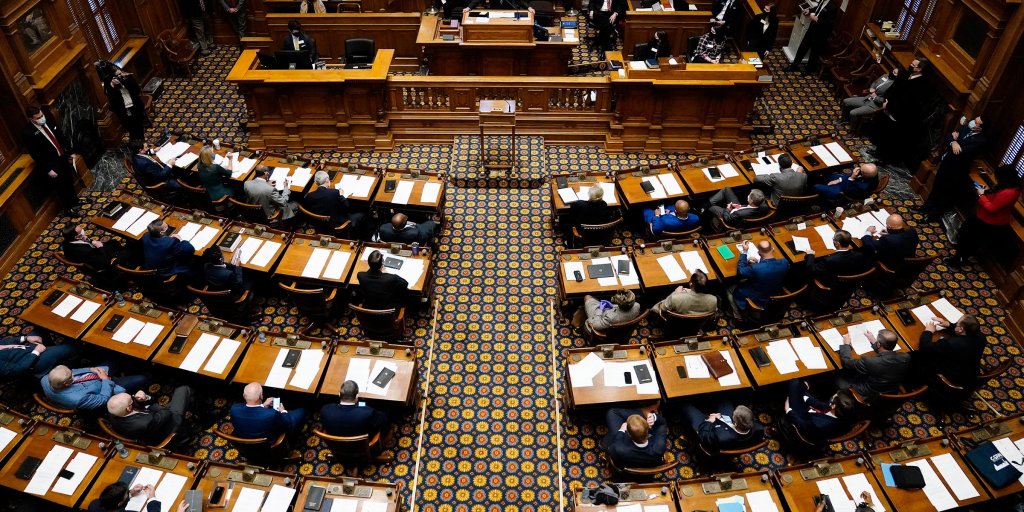Wednesday, February 24 completed Legislative Day 22 for the General Assembly, leaving 18 remaining legislative days. Crossover Day has moved to Legislative Day 27. We highlight some of the key legislative developments thus far:
COVID-19
HB 112, Introduced by Rep. Trey Kelley (R-Cedartown), passed the House 99-68. The COVID liability protection bill extends the sunset date out another year to July 14, 2022. The bill was introduced in the Senate and has been referred to the Judiciary Committee.
Business
SB 45, introduced by Sen. Bruce Thompson (R-White), would speed the process of occupational and professional licensure for new Georgia residents. It passed the Senate 37-15 and was introduced in the House last week.
HB 182, introduced by Rep. Marvin Lim (D-Norcross), would create an Entrepreneur Learner’s Permit program that helps first-time entrepreneurs by waiving some of the obligations when filing for a new business. It has been assigned to the House Economic Development and Tourism Committee.
HB 183, introduced by Rep. Marvin Lim (D-Norcross), would expand the current Georgia Fair Business Practices Act (FBPA) to permit businesses to make claims, in a “representative” capacity, against unfair or deceptive trade practices by businesses. Currently, the FBPA only allows consumers to make claims. It has been assigned to the House Judiciary Committee.
HR 11, authored by Rep. Wes Cantrell (R-Woodstock), would create the House Study Committee on Innovative Ways to Maximize Global Talent in Georgia. The House Small Business Development Committee favorably reported by substitute.
HB 150, introduced by Rep. Bruce Williamson (R-Monroe), would prohibit local governments from implementing policy that bans utility service based on the type of source of energy or fuel. The House passed the bill on Monday 103-62. It is now with the Senate Regulated Industries and Utilities Committee.
HB 306, sponsored by Representative Stan Gunter (R-Blairsville), would allow corporations to hold shareholders’ meetings remotely. On Wednesday the 24th, the House passed the measure 169-0.
Criminal Justice Reform
HB 479, sponsored by Rep. Bert Reeves (R-Marietta), would reform the roughly 150-year-old statute that allows any Georgian to arrest a suspected offender. This bill would still allow business employees and security officers to detain lawbreakers and off-duty police officers to make arrests when outside their jurisdiction. The bill is a continuation of Governor Kemp’s push from last year’s passage of hate-crimes law. It was introduced in the House and is currently with the House Judiciary Committee.
Taxes
SB 6, introduced by Sen. John Albers (R-Roswell), passed by the Senate 51-0 (5 excused) and has been sent to the House Ways and Means Committee. The bill would allow the Chairs of the Senate Finance Committee and the House Ways and Means Committee to request an economic analysis on up to five tax incentives each year.
HB 398, introduced by Rep. Bruce Williamson (R-Monroe), removes the jobs cap from the jobs tax credit. The bill passed the House Ways and Means Committee last Tuesday, the 16th.
HB 226, introduced by Rep. Gregg Kennard (D-Lawrenceville), would restore tax-exempt status for the ticket sales at non-profit performing arts businesses in Georgia. The status expired July 2020. The chamber announced its support of the bill. HB 226 language was recently added to HB 586, Georgia Economic Recovery Act of 2021. The bill is sponsored by Sam Watson (R-Moultrie) and Rep. Bonnie Rich of the Gwinnett House delegation is a co-sponsor. Rep. Shaw Blackmon (R-Bonaire), Chair of the House Ways and Means Committee, is also a co-sponsor.
HB 593, sponsored by Rep. Shaw Blackmon (R-Bonaire), would increase the standard deduction from $4,600 to $5,400 and $6,000 to $7,100 for individuals and jointly filing married couples, respectively. It would allow Georgians to save up to $75 per year on their income taxes and cost the state between $100 million and $150 million per year in foregone revenue. If approved, the changes would take effect on January 1, 2022.

